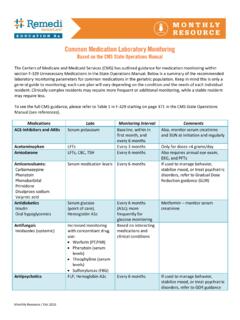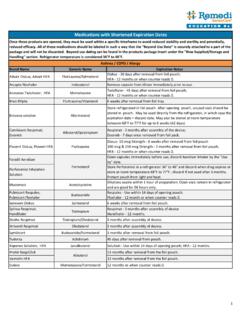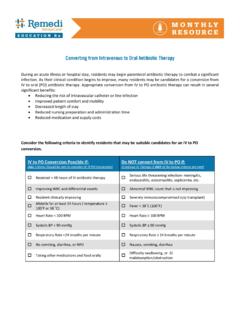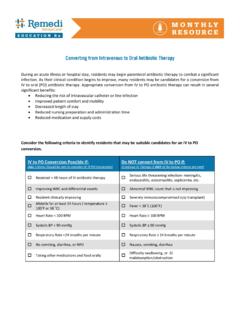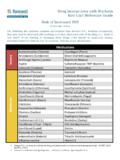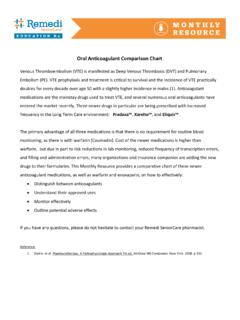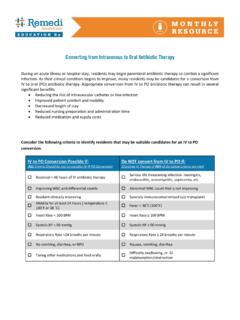Transcription of Drug Interactions with Warfarin Med Cart Reference Guide ...
1 1. Bungard TJ, et al. Drug Interactions involving Warfarin : practice tool and practical management tips. CPJ/RPC. 2011 Jan/Feb. 144(1). 2. Interactions with Coumadin [package insert]. Princeton, NJ: Bristol Myers Squibb; 2013. Drug Interactions with Warfarin Med Cart Reference Guide Risk of Increased INR (Overcoagulation) The following list contains common medications that interact with Warfarin (Coumadin), that may lead to increased INR readings and thus, increased risk of bleeding ( , blood is too thin ). When starting or changing these drugs, INRs should be monitored closely; decreased doses of Warfarin may be required. This list is not all-inclusive. MedicationsSevere Acetaminophen (Tylenol) Clopidogrel (Plavix) Amiodarone (Cordarone) Direct Oral Anticoagulants Antifungal Agents ( azoles) Ropinirole (Requip) Aspirin Sulfamethoxazole TMP (Bactrim) Celecoxib (Celebrex) Tamoxifen (Nolvadex) Moderate Acarbose (Precose) Isoniazid Allopurinol (Zyloprim) Lactulose (Enulose) Alprazolam (Xanax) Lansoprazole (Prevacid) Amlodipine (Norvasc) Levofloxacin (Levaquin) Azithromycin (Zithromax) Levothyroxine (Synthroid) Cimetidine (Tagamet) Methyl salicylate (topical) Ciprofloxacin (Cipro) Metronidazole (Flagyl) Clarithromycin (Biaxin) Moxifloxacin (Avelox) Colchicine Omeprazole (Prilosec) Doxycycline (Vibratab) Phenytoin (Dilantin) Efavirenz (Sustiva) Protease Inhibitors Ethanol Quetiapine (Seroquel) Erythromycin ( ) Ranitidine (Zantac) Fenofibrate (Tricor, Trilipix) SSRI Antidepressants Gemfibrozil (Lopid)
2 Statins Glyburide (Diabeta) Tramadol (Ultram) Indomethacin (Indocin) Tricyclic Antidepressants Influenza vaccine Vitamin E 1. Bungard TJ, et al. Drug Interactions involving Warfarin : practice tool and practical management tips. CPJ/RPC. 2011 Jan/Feb. 144(1). 2. Interactions with Coumadin [package insert]. Princeton, NJ: Bristol Myers Squibb; 2013. Drug Interactions with Warfarin Med Cart Reference Guide Risk of Decreased INR (Undercoagulation) The following list contains common medications that interact with Warfarin (Coumadin), which may lead to decreased INR readings and thus, increased risk of clotting, strokes, and DVTs ( , blood is not thin enough ). When starting or changing these drugs, INRs should be monitored closely; increased doses of Warfarin may be required. This list is not all-inclusive. MedicationsSevere Barbiturates class Phenobarbital Phenytoin (Dilantin) Rifampin (Rifadin) St.
3 John s Wort Moderate Azathioprine (Imuran) Mesalamine (Asacol) Bosentan (Tracleer) Methimazole (Tapazole) Carbamazepine (Tegretol) Nevirapine (Viramune) Cholestyramine (Questran) Primidone (Mysoline) Coenzyme Q10 Propylthiouracil Colestipol (Colestid) Raloxifene (Evista) Darunavir (Prezista) Ribavirin (Rebetol) Dicloxacillin Soy Estrogens (Premarin) Spironolactone (Aldactone) Ginseng Sucralfate (Carafate) Green tea Sulfasalazine (Azulfadine) Griseofulvin (Grifulvin V) Vitamin K (Mephyton) Isotretinoin (Accutane) Vitamin C (> 500 mg/day) 1. Bungard TJ, et al. Drug Interactions involving Warfarin : practice tool and practical management tips. CPJ/RPC. 2011 Jan/Feb. 144(1). 2. Interactions with Coumadin [package insert]. Princeton, NJ: Bristol Myers Squibb; 2013. Drug Interactions with Warfarin Med Cart Reference Guide Increased Risk of Bleeding The following is a list of common medications that can increase a patient s bleeding risk while on Warfarin therapy.
4 These medications may not require any change in Warfarin dose; however, signs and symptoms of bleeding should be monitored closely. This list is not all-inclusive. medication Class Medications Anticoagulants Apixaban (Eliquis) Heparin Argatroban Rivaroxaban (Xarelto) Dabigatran (Pradaxa) Edoxaban (Savaysa) Antiplatelet Agents Aspirin Ticagrelor (Brilinta) Cilostazol (Pletal) Clopidogrel (Plavix) Prasugrel (Effient) Non Steroidal Anti Inflammatory Drugs (NSAIDs) Naproxen (Naprosyn) Indomethacin (Indocin) Diclofenac (Voltaren) Celecoxib (Celebrex) Ibuprofen (Motrin) Ketorolac (Flector) Salsalate (Disalcid) Serotonin Reuptake Inhibitors (SSRIs and SNRIs) Citalopram (Celexa) Paroxetine (Paxil) Desvenlafaxine (Pristiq) Sertraline (Zoloft) Duloxetine (Cymbalta) Venlafaxine (Effexor) Escitalopram (Lexapro) Vortioxetine (Brintellex) Fluoxetine (Prozac)
